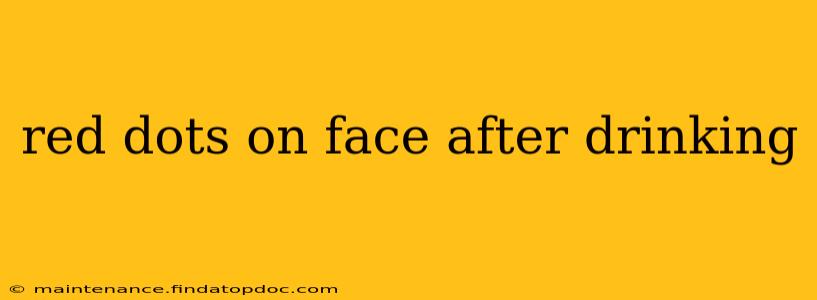Experiencing red dots on your face after drinking alcohol can be alarming and frustrating. While a simple case of flushed skin is common, persistent or severe reactions warrant attention. This comprehensive guide explores the potential causes of these red dots, effective remedies, and preventative measures to help you understand and address this issue.
What Causes Red Dots on My Face After Drinking?
The appearance of red dots after alcohol consumption can stem from several factors, ranging from benign to more concerning medical conditions.
1. Alcohol Flush Reaction: This is the most common cause. A genetic predisposition leads to an inability to fully metabolize acetaldehyde, a byproduct of alcohol breakdown. This build-up causes blood vessels to dilate, resulting in redness, flushing, and sometimes a rash of small red dots. It's generally harmless but can be uncomfortable.
2. Allergic Reaction: Although less frequent, an allergic reaction to alcohol or a component in your drink (additives, preservatives) can manifest as a rash, including red dots. Symptoms can range from mild itching to more severe reactions. If you suspect an allergy, seek medical advice.
3. Rosacea Flare-Up: Alcohol is a known trigger for rosacea, a chronic skin condition characterized by redness, flushing, and visible blood vessels. Drinking can exacerbate existing rosacea, leading to a worsening of symptoms, including the appearance of red bumps or dots.
4. Histamine Release: Alcohol can stimulate the release of histamine, a chemical involved in allergic responses. This can cause skin reactions, including itching, hives, and the development of red dots.
5. Dehydration: Alcohol is a diuretic, meaning it increases urination and can lead to dehydration. Dehydration can worsen existing skin conditions or cause new ones to appear, potentially contributing to the appearance of red dots.
Is it an Allergic Reaction to Alcohol?
H3. How can I tell if my red dots are due to an alcohol allergy?
Determining if red dots are due to an alcohol allergy requires considering the accompanying symptoms. Besides the red dots, look for:
- Hives or welts: Raised, itchy bumps on the skin.
- Swelling: In the face, lips, or throat (this is a serious symptom requiring immediate medical attention).
- Itching: Intense itching in the affected area.
- Difficulty breathing: A severe allergic reaction.
- Anaphylaxis: A life-threatening allergic reaction requiring immediate emergency medical care.
If you experience any of these symptoms alongside the red dots, seek immediate medical attention. A doctor can conduct allergy testing to confirm an alcohol allergy.
How Can I Treat Red Dots After Drinking?
Treatment depends on the underlying cause. For alcohol flush reaction, the most effective treatment is avoidance of alcohol. If you choose to drink, do so in moderation.
For mild cases:
- Cool Compress: Applying a cool compress can help soothe inflamed skin and reduce redness.
- Hydration: Drinking plenty of water helps flush out toxins and counteract alcohol's dehydrating effects.
- Avoid Hot Showers: Hot water can exacerbate redness and inflammation.
- Over-the-Counter Antihistamines: If itching is present, an over-the-counter antihistamine like diphenhydramine (Benadryl) may provide relief. (Always follow product instructions.)
For more severe cases or if you suspect an allergy or rosacea flare-up, consult a dermatologist or allergist. They can diagnose the underlying cause and recommend appropriate treatment, which may include topical creams, oral medications, or other therapies.
How Can I Prevent Red Dots From Appearing After Drinking?
Prevention strategies focus on minimizing alcohol intake and managing potential triggers:
- Moderate Alcohol Consumption: Limit your alcohol intake to reduce the chances of a reaction.
- Hydration: Drink plenty of water before, during, and after alcohol consumption.
- Identify Triggers: Keep a record of what you drink and note any patterns associated with red dots to identify potential triggers.
- Manage Rosacea: If you have rosacea, work with your dermatologist to manage the condition and minimize flare-ups.
- Healthy Lifestyle: A balanced diet, adequate sleep, and stress management can contribute to healthier skin.
Disclaimer: This information is for educational purposes only and should not be considered medical advice. Always consult with a healthcare professional for any health concerns or before making any decisions related to your health or treatment.
